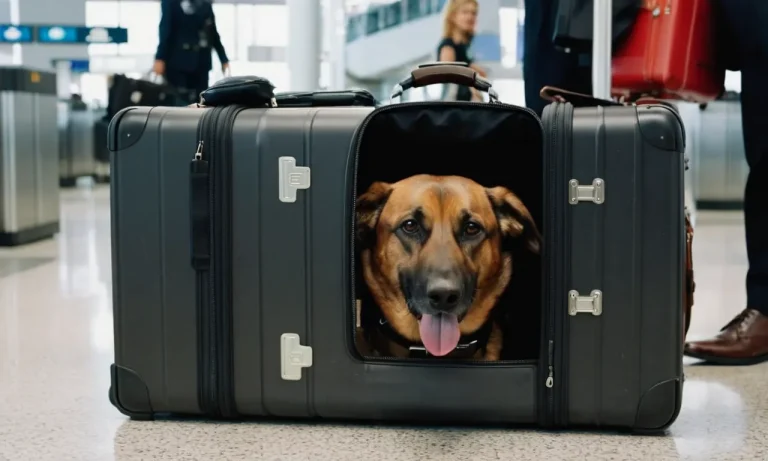Getting hit with a big bill for damage to a rental car can be upsetting. You may find yourself wondering if you have to pay or if you can just refuse.
This is an understandable reaction, but refusing to pay rental car damage comes with serious risks you need to consider.
If you’re short on time, here’s a quick answer to your question: Refusing to pay for valid rental car damage can lead to the rental company sending you to collections, impacting your credit score, reporting you to insurance, and potentially suing you to recover costs.
It’s best to work with the rental company to resolve any disputes over damage fees.
In this comprehensive guide, we’ll discuss everything you need to know about what happens if you refuse to pay rental car damage fees.
We’ll cover the typical process rental companies follow to collect damages, the potential consequences of refusing to pay, how to dispute improper fees, and tips for avoiding issues in the first place.
The Rental Company’s Process for Collecting Damage Fees
Inspecting the Car and Documenting Damages
When you return a rental car, the rental company will typically conduct a thorough inspection to assess any damages.
They will inspect both the exterior and interior of the vehicle, looking for any scratches, dents, or other signs of damage.
The rental company will document these damages and compare them to the condition of the car when it was rented to you.
This is why it’s important to inspect the car before you drive off the lot and note any pre-existing damage.
Sending You a Bill for the Damage
If the rental company finds any new damages that were not present at the time of rental, they will send you a bill for the repair costs.
The bill will typically include a breakdown of the damages, the cost of repairs, and any administrative fees.
It’s important to carefully review the bill and compare it to the initial inspection report to ensure the charges are accurate.
Sending Overdue Notices and Calls
If you refuse to pay for the rental car damage, the rental company will likely send you overdue notices and make phone calls to remind you of the outstanding balance. They may also charge late fees or interest on the unpaid amount.
It’s important to communicate with the rental company and address any concerns or disputes you may have about the charges.
Reporting Damage Fees to Insurance
If you have insurance coverage that includes rental cars, the rental company may report the damage fees to your insurance provider. Your insurance company will then assess the claim and determine if they will cover the costs.
It’s important to check with your insurance provider to understand the extent of your coverage and any deductibles that may apply.
Sending Account to Collections
If you still refuse to pay for the damage after repeated attempts by the rental company to collect the fees, they may choose to send your account to a collections agency.
This can have a negative impact on your credit score and make it more difficult for you to obtain credit in the future.
It’s important to try and resolve any disputes or payment issues before reaching this point.
Legal Action
In extreme cases where the rental company is unable to collect the damage fees through other means, they may choose to take legal action against you.
This could result in a lawsuit, where you may be required to appear in court and potentially face additional costs and penalties.
It’s always best to try and resolve any payment disputes before it escalates to this level.
Consequences of Refusing to Pay Rental Car Damage
When you rent a car, it is important to take care of it and return it in the same condition you received it. However, accidents happen, and sometimes there may be damage to the rental car.
If you refuse to pay for the rental car damage, you may face several consequences that can have long-lasting effects on your finances and future car rental experiences.
Credit Score Damage from Collections
If you refuse to pay for rental car damage, the rental company may send the unpaid bill to a collections agency. This can result in a negative mark on your credit report, which can lower your credit score.
A lower credit score can make it more difficult to obtain credit in the future, such as loans, credit cards, or even a mortgage.
Difficulty Renting Cars in the Future
Another consequence of refusing to pay for rental car damage is that it may make it difficult for you to rent cars in the future.
Rental companies often share information about customers who have refused to pay for damages, and this information can be accessed by other rental companies.
As a result, you may be denied future rentals or required to provide a larger deposit or purchase additional insurance coverage.
Insurance Rate Increases
If you refuse to pay for rental car damage and your insurance was covering the rental, your insurance company may increase your rates.
Insurance companies consider incidents of non-payment as a risk factor, and they may adjust your rates accordingly.
This can result in higher premiums for your auto insurance, which can add up over time.
Wages or Bank Accounts Garnished
In some cases, if you refuse to pay for rental car damage and the rental company takes legal action against you, they may be able to garnish your wages or freeze your bank accounts.
This can have a significant impact on your financial stability and make it difficult for you to meet your other financial obligations.
Lien Placed on Property
If the rental company obtains a judgment against you for the unpaid rental car damage, they may be able to place a lien on your property.
This means that if you own a home or other valuable assets, the rental company can have a legal claim on them until the debt is satisfied.
This can make it difficult for you to sell or refinance your property.
Civil Judgement
If the rental company takes legal action against you and obtains a civil judgment, it can have serious consequences.
A civil judgment can impact your ability to borrow money, obtain credit, or even secure employment. It can also result in additional legal fees and court costs.
It is important to remember that refusing to pay for rental car damage can have serious financial and legal repercussions. It is always best to address the issue directly with the rental company and find a resolution that is fair for both parties.

Disputing Improper Rental Car Damage Fees
When renting a car, it is not uncommon for customers to encounter situations where they believe they are being unfairly charged for damage to the vehicle.
If you find yourself in this predicament, it is important to know your rights and take the necessary steps to dispute these charges.
Gather Documentation
The first step in disputing improper rental car damage fees is to gather as much documentation as possible.
This includes taking photos or videos of the vehicle before and after your rental period, documenting any existing damage with the rental company, and obtaining any relevant paperwork such as the rental agreement or inspection report.
This evidence will be crucial in proving your case.
Compare to Rental Contract Terms
Next, carefully review the rental contract terms to determine if the charges being assessed align with the agreed-upon terms. Pay close attention to any clauses or provisions related to damage and liability.
If you find that the charges are in violation of the contract terms, you have a strong case for disputing the fees.
Negotiate with Rental Company
If you believe that the charges are unjust, it is worthwhile to reach out to the rental company directly to discuss the issue.
Remain calm and polite during the conversation, clearly stating your concerns and providing any evidence you have gathered.
In some cases, the rental company may be willing to negotiate or waive the fees altogether.
Use Arbitration or Mediation Services
If your attempts to resolve the dispute directly with the rental company are unsuccessful, consider utilizing arbitration or mediation services.
These services provide a neutral third party who can help facilitate a resolution between you and the rental company.
This can be a more formal and structured process, potentially leading to a fairer outcome.
File Complaint with Better Business Bureau
If all else fails, you can file a complaint with the Better Business Bureau (BBB). The BBB acts as a mediator between consumers and businesses and can help facilitate a resolution.
Filing a complaint with the BBB can also alert other consumers to potential issues with the rental company.
Consult Consumer Protection Attorney
In extreme cases where the rental company continues to insist on improper charges, it may be necessary to consult a consumer protection attorney.
These legal professionals specialize in protecting consumers’ rights and can guide you through the process of taking legal action if necessary.
Remember, it is important to carefully document and follow the proper procedures when disputing rental car damage fees. By being proactive and assertive, you can increase the chances of a successful resolution to your dispute.
Tips to Avoid Issues with Rental Car Damage
Document Pre-Existing Damage Thoroughly
Before driving off with a rental car, it’s crucial to thoroughly inspect the vehicle for any pre-existing damage. Take note of scratches, dents, and any other imperfections by documenting them with clear photos or videos.
This step is essential to protect yourself from being held responsible for damage that was already there before you rented the car.
Purchase Rental Insurance Options
One of the best ways to avoid issues with rental car damage is to purchase the rental insurance offered by the rental company.
However, before purchasing rental insurance, be sure to review your personal car insurance policy or credit card benefits, as you may already have coverage.
Use Credit Card Insurance Benefits
Many credit cards offer rental car insurance benefits as part of their rewards program. Before renting a car, check with your credit card company to see if you have this coverage.
If you do, make sure to familiarize yourself with the terms and conditions, such as any exclusions or limitations.
It’s also important to note that credit card insurance benefits may only cover damage to the rental car and not liability for injuries or damages to other parties.
Avoid Risky Driving Behavior
One of the best ways to prevent rental car damage is to practice safe and responsible driving. Avoid risky behaviors such as speeding, tailgating, or aggressive maneuvering.
These actions increase the likelihood of accidents and damage to the rental car.
Remember, being a cautious and defensive driver not only keeps you safe but also helps protect the rental car from unnecessary harm.
Return Car Clean and with a Full Tank
When returning a rental car, it’s important to clean the vehicle and ensure it has a full tank of gas. Some rental companies may charge additional fees for returning a dirty car or for refueling the vehicle.
By returning the car in the same condition as when you received it, you can avoid these extra charges and potential disputes over cleanliness or fuel levels.
Take Clear Photos at Return
Before handing over the keys to the rental company, take clear photos of the car’s exterior and interior. These photos can serve as evidence of the car’s condition at the time of return, protecting you from false claims of damage.
Make sure the photos are clear and timestamped, and keep them on your phone or another secure location for easy access if needed.
By following these tips, you can minimize the likelihood of issues with rental car damage and ensure a smooth and hassle-free rental experience.
Remember, it’s always better to take proactive measures to protect yourself, rather than dealing with the consequences of refusing to pay for damages.
Conclusion
Dealing with rental car damage fees can be extremely frustrating. However, refusing to pay a valid claim will only make the situation worse in the long run. You may face collections, credit impacts, civil court cases, and more.
The best approach is to remain calm, gather documentation, negotiate reasonably, and utilize reputable mediation if needed. With preparation and care, you can often avoid rental car damage issues altogether.
Armed with the guidance above, you can handle this challenging scenario while protecting yourself and your finances.






